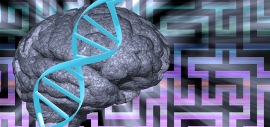Blog: The Brain Dialogues, filtered by tag: genetics
Dr Anbu Thalamuthu | Meet Our Researcher Series
CHeBA’s Genetics & Epigenomics Group is primarily concerned with identifying factors defining healthy cognitive function, as well as physical and mental wellbeing. Dr Thalamuthu, one of CHeBA’s senior Research Fellows, is providing critical analysis of age-related phenotypes to achieve this goal, bringing us one step closer to improving quality of life across the lifespan.
How did you get into researching the ageing brain?
I obtained my PhD in Statistics from the University of Madras, Chennai in Tamil Nadu, South India. Being a statistician, I had the opportunity to work in several… Read More
Gene Expression Profiling to Treat Brain Cancer
Research Officer in CHeBA’s Genetics & Epigenomics Group, Naga Mutyala, completed her PhD in March 2020 which focused on evaluating a rodent model and novel treatments for glioblastoma, a grade IV brain cancer, using gene expression profiling.
Glioblastoma is the most lethal grade of brain cancer in adults and resultantly has very poor patient outcomes with a median survival rate of only 15 months.
To improve treatment success further evaluation of alternative therapies is urgently required. Therefore, we examined the efficacy of an antipsychotic drug olanzapine as an alternative… Read More
Blood Test for Alzheimer’s: Close Or Hype?
This article was originally published in the The Conversation on 28 July 2016
Anyone who has ever visited a doctor’s office is familiar with the use of blood tests for the diagnosis of various diseases. Because blood comes in contact with all organs of the body, it carries markers of the health of these organs. It is an easily accessible body fluid, can be drawn repeatedly to follow the progress of a disease and, in most cases, blood tests are relatively inexpensive.
It is therefore not surprising news that a possible blood test for dementia, in particular Alzheimer’s disease, gets much… Read More
The Role of Epigenetics in Cognitive Ageing
DR KAREN MATHER
As we age, there is a decline in cognitive performance but there is great variability in the rate and degree of cognitive ageing observed across older adults. The domains of information processing speed, episodic memory (autobiographical memory) and executive function (decision making) are most affected. However, the biological processes driving this age-related cognitive decline are unclear. A greater understanding of the causes and correlates of cognitive ageing would assist in identifying individuals at risk of cognitive decline and suggest interventions that may… Read More




